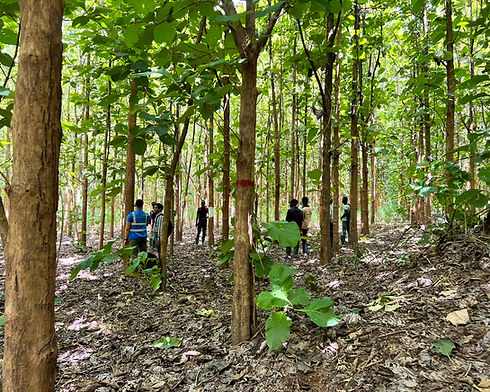
Our Forestry

Proven Track Record
Started in 2007, Mere Plantations has developed into the largest privately-owned, privately-funded hardwood plantation in West Africa. The company is proud to have received no financial contribution from Governments, aid agencies or NGOs - an income source which the sector as a whole has become reliant upon.
With over 2,300 hectares planted to date and almost 1 million cubic meters of timber we are one of the largest teak plantations worldwide. Our yield and growth rates for teak are significantly in excess of recorded figures in Ghana, and are increasing every year. We balance maximum timber production and carbon removal alongside ecological restoration.
From Seed to Saw®
We aren't a tree planting company, and we aren't a logging company. What we do is provide a commercial turn-key solution to the global need for restoring degraded land, and producing sustainable timber. By managing the process from initial germination and seed selection to the final harvest, we ensure that the timber produced meets the highest environmental and traceability criteria.
Control and oversight over the full growing cycle helps Mere ensure consistency in the end product - producing timber with minimal knots and defects. All of our continuous forest management and maintenance is done with one eye on the final product, even if the stand won't be harvested for another decade.


Blending Traditional and Modern Forestry
Traditional forestry plays a large part in our operations today. All of our forestry practices, from our germination techniques, to assessing ecosystem resilience to pest and disease, have their roots in traditional knowledge which has been passed down for generations. Understanding both how nature works, and how to work alongside nature is essential.
Our traditional forestry practices are supplemented by modern technology and approaches to forestry. Tools such as satellite monitoring, fire detection software and drone imagery help inform management decisions on a daily basis.
Large Enough to Drive Change, Small Enough to Care
Many of the staff in Ghana who carried out our first planting in 2011 are still with the company today. We have watched over the last 14 years as the towns, villages and forest-fringe communities surrounding the plantation expand, develop and thrive.
Our benefit sharing agreements ensure that 10% of our Standing Timber Value go towards the stakeholders of the project, including the local communities and Forestry Commission. Mere also implements a voluntary benefit sharing agreement with funds dedicated specifically to high-impact local projects such as roads, clean drinking water and school repairs.
In rural Ghana, the ILO calculate that every dollar spent on quality, salaried employment yields $33 of benefits for the local community through the local multiplier effect. By employing up to 1,000 workers we are proud to be contributing to genuine social impact.


Forest-First
Teak plantations can sometimes be viewed as negative regarding biodiversity and forest health. When teak plantations utilise chemicals indiscriminately, clear as much native vegetation as possible and clear cut the stand after a period of time, we believe these negative perceptions are completely fair.
Our forestry operations are designed to restore and repair the forest for commercial output, not to sterilise it. Planting native species alongside the teak, planting and maintaining biodiversity corridors and riparian zones are some of the ways we are looking after native flora. Using chemical herbicides is only carried out during planting on invasive species, or species which have a negative impact on the restoration of biodiverse forest cover.
We employ 24/7 security patrol teams who work to counter illegal wildlife poaching and hunting within the forest reserve, thereby allowing the food chain within the forest to develop and for biodiversity to return to the site.
Doing Things Differently
There is no single practice we carry out which allows us to achieve best-in-class growth rates. The combination of many factors, such as the site topography and climate, seed stock used, soil management practices and individual tree care contribute to the positive results we are seeing.
We regularly trial new technologies and practices within the plantation, ranging from introducing Ghana's first cyclone mowers, which mulch the vegetation between the trees to reduce fire risk and increase tree growth, to hydrogels lessening the impact of the dry season and improving survival.
We pride ourselves on using new and innovative practices to positively disrupt the plantation and nature-based solutions industries, re-inventing best practice procedures and optimal management for teak plantations worldwide.
